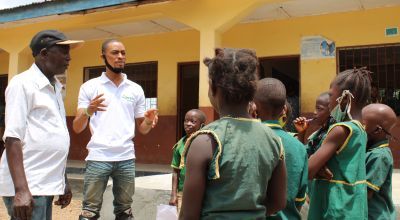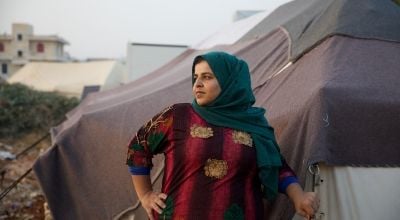
Read our 2023 annual report

Knowledge Hub
Before the violence, Sabah and her family lived a simple but secure life.
“I was a housewife,” she says, “my husband worked in construction as a daily labourer. Although his job was not permanent, life was simple, Syria was safe, and everything was affordable and accessible.”
Conflict changes everything. Those who survive the shelling and gunfire often do so by fleeing their homes, with no idea of when they can return.
“Once the conflict started, everything changed. Job opportunities disappeared, the value of our currency fell, food prices increased, the cost of health care and medicine increased. We now live in constant fear and uncertainty about the future.”
Since 2011, it is estimated that over 300,000 Syrians have lost their lives, and more than 13 million have been displaced. Sabah, her husband, and their five children are among them, living in a displacement camp in northern Syria.

When Sabah’s husband was no longer able to do physical labor due to a leg injury, the family began to borrow money to meet their needs, and their debts gradually increased. Sabah needed to work to help meet their family’s needs. “Securing employment often requires an educational degree or professional experience,” Sabah says. “Even if you have the necessary skills, starting your own business demands capital.”
Concern is working with Irish Aid in Syria to support vulnerable women and children, helping them build resilience and stay safe. Concern empowers mothers, and other female caregivers, through business management skill training and the provision of small business grants. These grants enable families to generate income and meet their basic needs.

Concern also offers case management services and psychosocial support to children within Child-Friendly Spaces, providing them with a safe, positive space in which to heal. This effort is complemented by our positive parenting sessions, in which caregivers learn stress management skills, and how to foster a positive home environment.
Sabah attended the positive parenting sessions, and her children enjoyed activities in the Child-Friendly Space. She also received business management training and a small business grant. While Sabah had been sewing for years, she was using an old machine and lacked a reliable source of power. As a consequence, her work was slow, and she couldn’t take on many customers. With the grant, Sabah purchased a new sewing machine, a knitting machine, a generator, and a table to make the process more comfortable. Her business grew.

“I can now work more efficiently and for longer hours. I can now offer a variety of fabrics for sale, allowing my customers to choose what they want and find the latest trends for every season,” she says.
When struggling to survive, imagining a future beyond the next meal is difficult. Sabah and her family now have room to breathe. The children talk about what could be: “They dream of having a refrigerator and doors for the rooms in our home.”
Names have either been changed or withheld.




